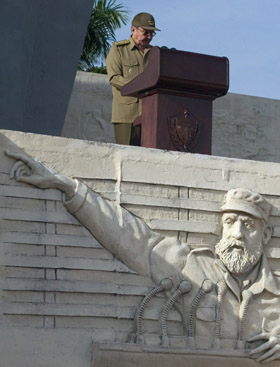Raul Castro sees economy reform, talks with US
(Reuters)Updated: 2007-07-27 01:57 CAMAGUEY, Cuba - Acting President Raul Castro asserted his leadership of Cuba on Thursday with promises of economic improvement and an offer of talks with the United States when the Bush administration is gone.
"Raul, Raul, Raul!" some 100,000 government supporters chanted during a Revolution Day speech one year after taking over from his brother.
He said Cuba's 80-year-old leader Fidel Castro, who is recovering from life-threatening surgery and has not appeared in public for a year, was increasingly active.
But Raul Castro's one-hour speech left no doubt that he is in charge for now.
He said salaries were too low -- a major complaint by Cubans-- and the country has to produce more food to feed its people. Deep reforms of its inefficient agriculture are on their way, he said.
Cuba is open to receiving more foreign investment as long as it brings capital, technology and markets, he said.
"There won't be spectacular results. Time is needed," Raul Castro, who is 76 and considered to be more pragmatic than his brother, told Cubans.
"Fidel is not here, but it's the same. We have him in our hearts and Raul is doing a good job," said Dignora, a labor union official wearing a red T-shirt and waving a Cuban flag.
Cuba's most important holiday marks the attack led by Fidel Castro on the Moncada army barracks in the eastern city of Santiago in 1953. That launched his armed revolt against a US backed-dictator that triumphed in 1959.
Raul Castro said it has been a difficult year since his brother fell ill because Cuba's enemies in the United States had banked on the collapse of its socialist system.
The administration of US President George W. Bush stepped up an "implacable war" to undermine Cuba with trade and financial sanctions that include denying Cuban access to international financial services, he said.
But he said Cuba remains stable and Cubans united behind the ruling Communist Party.
"Cuba is a dangerous example in a poor continent. They have not succeeded in bringing us to our knees," he said.
The Bush administration has rejected what it calls a "succession from one dictator to another" in Cuba.
Raul Castro last year twice made overtures to the United States offering to negotiate an end to the decades-old political rift on an equal footing. He is now looking past the next US presidential elections.
"The new administration will have to decide whether it maintains this absurd, illegal and failed policy against Cuba or accepts the olive branch we extended," he said.
"If the next US government puts arrogance aside and decides to talk in a civilized fashion, that is welcome. If not, we are prepared to continue facing their hostile policy for another 50 years," he said.
|
|
|
||
|
||
|
|

